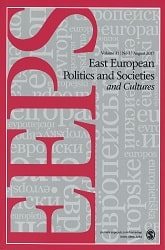Reconstruction as Revolution: Cultural Life in Post–World War II Kraków and Leipzig
Reconstruction as Revolution: Cultural Life in Post–World War II Kraków and Leipzig
Author(s): Kyrill KunakhovichSubject(s): Cultural history, Political history, Culture and social structure , Social development, Sociology of Culture, WW II and following years (1940 - 1949), Post-War period (1950 - 1989), History of Communism
Published by: SAGE Publications Ltd
Keywords: Sovietization; Cultural policy; Reconstruction; Poland; East Germany;
Summary/Abstract: This article compares the process of cultural reconstruction in two of Eastern Europe’s major cities, Kraków and Leipzig, in the first half-decade after World War II. In both cities, it argues, reconstruction radically changed the cultural landscape even as it seemed to uphold the status quo. City officials rebuilt many of the artistic institutions they knew from the prewar era, but consistently privileged those that were publicly owned and “progressive.” Such selective reconstruction greatly expanded state control over the arts while masking the fact that any change was taking place. It also made Kraków and Leipzig more alike: by accentuating each city’s leftist traditions, local officials fostered a cultural convergence without eliminating national difference. Their work was instrumental in the rise of East European communism. Grassroots reconstruction not only paved the way for cultural revolution but also helped to forge the Soviet Bloc.
Journal: East European Politics and Societies
- Issue Year: 30/2016
- Issue No: 03
- Page Range: 475-495
- Page Count: 21
- Language: English
- Content File-PDF

